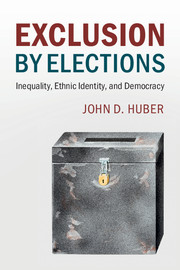Book contents
- Frontmatter
- Contents
- List of Figures
- List of Tables
- Acknowledgments
- 1 Introduction
- 2 Why Worry about Inequality and Ethnic Politics?
- PART I THE THEORETICAL ARGUMENT
- PART II EMPIRICAL EVIDENCE FOR THE ARGUMENT
- 6 Theory and Causal Identification
- 7 Income and Voting Behavior
- 8 Inequality, Ethnic Diversity, and the Ethnification of Party Systems
- 9 Social Structure, Redistribution, and Democratic Transitions
- 10 Conclusion: Inequality and the Politics of Exclusion
- References
- Index
- Miscellaneous Endmatter
6 - Theory and Causal Identification
from PART II - EMPIRICAL EVIDENCE FOR THE ARGUMENT
Published online by Cambridge University Press: 18 May 2017
- Frontmatter
- Contents
- List of Figures
- List of Tables
- Acknowledgments
- 1 Introduction
- 2 Why Worry about Inequality and Ethnic Politics?
- PART I THE THEORETICAL ARGUMENT
- PART II EMPIRICAL EVIDENCE FOR THE ARGUMENT
- 6 Theory and Causal Identification
- 7 Income and Voting Behavior
- 8 Inequality, Ethnic Diversity, and the Ethnification of Party Systems
- 9 Social Structure, Redistribution, and Democratic Transitions
- 10 Conclusion: Inequality and the Politics of Exclusion
- References
- Index
- Miscellaneous Endmatter
Summary
A central emphasis in recent empirical social science research is that we should be skeptical of what we can learn from traditional regression-type approaches to analyzing observational data. This presents an obvious problem for me, as I hope the reader will take my evidence seriously, but I will be employing the sort of cross-national regressions that are often viewed as particularly unconvincing. The purpose of this chapter is to address this skepticism in two ways. First, I argue that the research tools that have been developed to address the shortcomings of traditional methods are much better suited for addressing some types of empirical questions than others. As a consequence, when we emphasize the use of these tools we bias our research agendas against exploring particular types of research questions. By thinking about the types of questions for which the methods are least well suited to study, it becomes clear why it would be essentially impossible to apply these methods to the questions central to this book. Thus, to test the theory I employ traditional methods.
But the fact that I must rely on the traditional methods does not obviate the concerns about them. My second response is to argue that we can learn the most from traditional methods if we carefully integrate theory and empirical work. Specifically, by developing theories that imply a range of related but conceptually distinct empirical relationships and by examining evidence for the range of these relationships, we can increase our confidence in the theory, even when evidence for specific relationships implied by the theory has the flaws of traditional approaches. And if we can increase our confidence in the theory, we should increase our confidence in the causal processes implied by the theory. A tighter integration of theory – as narrowly conceived here – and empirical evidence can therefore help us make progress on the types of questions that research methods focusing on causal identification are least well equipped to address. This is the approach I follow, and in this chapter, I develop these two responses in turn, beginning with the argument about biased agendas in research motivated by causal identification.
- Type
- Chapter
- Information
- Exclusion by ElectionsInequality, Ethnic Identity, and Democracy, pp. 101 - 113Publisher: Cambridge University PressPrint publication year: 2017
- 1
- Cited by



